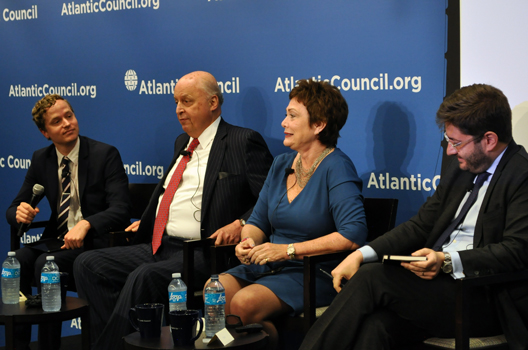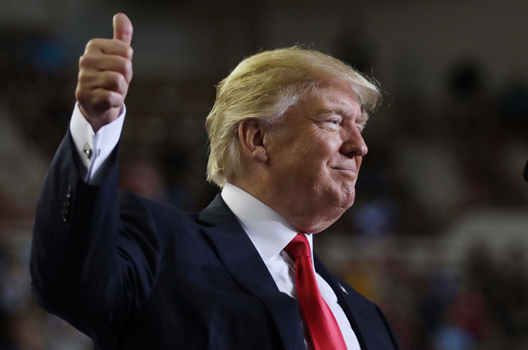 US President Donald J. Trump’s first one hundred days in office have been defined by uncertainty, rhetorical blunders, and a degree of success, which, despite the criticism levelled at Trump, is part of the “learning curve” for any new president, according to a former Director of National Intelligence.
US President Donald J. Trump’s first one hundred days in office have been defined by uncertainty, rhetorical blunders, and a degree of success, which, despite the criticism levelled at Trump, is part of the “learning curve” for any new president, according to a former Director of National Intelligence.
“I’ve noted in past presidencies not unsimilar phenomena,” John Negroponte, who served as Director of National Intelligence in the George W. Bush administration and is also a former US ambassador to Mexico, Iraq, and the United Nations, said at the Atlantic Council on May 1.
“People come into office with their own notions of what they’re going to accomplish,” said Negroponte. However, he added, over the course of the first one hundred days, a traditional benchmark for measuring how well a new administration can capitalize on the momentum of electoral victory, “those views get tempered by reality.”
Such expectations of incoming presidents are also tempered “by their encounters, and their meetings and discussions with their peers on the international scene,” said Negroponte, a dynamic which is “particularly important in the case of Mr. Trump.”
Trump completed one hundred days in the White House on April 29. Since taking office, he has met with a range of leaders, including German Chancellor Angela Merkel, British Prime Minister Theresa May, Chinese President Xi Jinping, and Canadian Prime Minister Justin Trudeau.
Speaking on Trump’s heavy travel schedule over the next few months, booked up with meetings, summits, and conversations with a variety of world leaders, Negroponte said: “I promise you that’s going to lead to an even more informed foreign policy going forward.”
However, while European allies look forward to welcoming Trump to the May 25 NATO Summit in Brussels, the president has been criticized for his decision to invite to the White House two leaders accused of human rights abuses—Turkish President Recep Tayyip Erdoğan and Philippine President Rodrigo Duterte.
On the campaign trail and in the early days of his presidency, Trump’s controversial decisions to defy convention may have helped him to rally a voter base. However, according to Negroponte, “this up until now has been an ahistorical administration. I think history is going to catch up with him.”
Negroponte joined Ellen Tauscher, vice chair of the Brent Scowcroft Center on International Security, and Manuel Muniz, director of the program on Transatlantic Relations at Harvard University’s Weatherhead Center for International Affairs, to assess the first one hundred days of the Trump administration at an event hosted by the Atlantic Council’s Brent Scowcroft Center on International Security. John Hudson, a foreign affairs reporter with BuzzFeed News, moderated the discussion.
The panelists discussed Trump’s handling of the major challenges—foreign and domestic—which have defined the advent of his administration. Thus far, the president has had to contend with destabilizing activity from Russia, criticism of controversial executive orders, a chemical attack in Syria, persistent racial tensions, and a nuclear threat from North Korea.
According to Negroponte, “he knows more about these issues than he did one hundred days ago.” However, Tauscher, who has previously served as a Democratic member of US House of Representatives and an undersecretary of state for arms control and international security affairs, contended that Trump has a great deal more to learn. “There’s a shocking naïveté about how all this is done,” she said, which is most apparent in Trump’s established pattern of sending mixed messages to allies and adversaries alike. 
President Donald Trump leads a rally marking his first one hundred days in office in Harrisburg. (REUTERS/Carlos Barria)
Trump has wavered between harsh rhetoric and retracted statements on the North American Free Trade Agreement (NAFTA), the value of NATO and the European Union (EU), the US stance vis-à-vis North Korea, China’s status as a currency manipulator, and the US role in Syria.
While Trump has dropped his criticism of China as a currency manipulator based on his perception of its role in containing the threat posed by North Korea, on NAFTA, his threats to withdraw the United States from the free-trade agreement seemed to materialize, until they dissipated into a proposal for the three parties to the deal—Mexico, Canada, and the United States—to renegotiate the agreement. “I think a realization has set in that this is really serious business and we better be careful,” said Negroponte.
According to Negroponte, “on a lot of these issues that he has raised, you see the whole system of checks and balances in this country very much at work.” Not only have the branches of government worked to keep Trump’s policies in check, but the media has as well, he said. “Now, he has to contend with reactions of foreign countries” as well, Negroponte added. The issue, according to Tauscher, is that Trump is, first and foremost, a businessman and a self-proclaimed deal-maker. “He has a corporate view of things; everything is about the deal,” she said, adding: “I think what he missed someplace along the line is that government isn’t a business.” Allies and adversaries, not just the bottom line, must be considered.
For example, Trump has criticized US allies in NATO for not “paying their fair share,” referring to the agreement that all Alliance member nations will allocate 2 percent of gross domestic product to defense spending. While this is an issue that has broad support in Congress, said Muniz, the focus on economic equity has obscured the key issue which is that the weakening of relations within Europe and NATO allies, negatively affected by the rising tide of populism throughout Europe, is a significant threat to US national security interests.
While the issue of 2 percent spending led Trump to label NATO as “obsolete” in an interview that rattled allies, he later retracted the statement. “I think there’s a little bit of Donald Trump’s way he’s always done things,” said Tauscher. “I think now he’s course-correcting, not necessarily because he wants to, but because it’s the way things have to be,” she added.
Trump’s “course-correcting” should inform the drafting of foreign policy and national security strategies, according to Tauscher, neither of which have been put forth by the new administration.
She said that in order to devise a cohesive strategy to address the many challenges facing the United States, the administration must begin to fill the empty seats in the State Department and the National Security Council (NSC). While Tauscher claimed that Trump did well to select Gen. James Mattis as US secretary of defense and Gen. H.R. McMaster as his second national security advisor, she insisted they need more people with relevant expertise in office.
The Trump administration “doesn’t want to fill these jobs,” at NSC and State, Tauscher claimed, but “they’re going to find themselves [starting] to depend on the people who have done these jobs for a long time.”
Despite the administration’s initial growing pains, when asked what she would consider Trump’s best decision in his first one hundred days, Tauscher singled out the US missile strike on Syria in response to the chemical attack believed to have been conducted by Syrian President Bashar al-Assad’s regime in April.
“I support the fact that he did that,” she said. “The problem is, I still don’t know what his policy is [on Syria].”
By contrast, Negroponte said Trump’s worst decision was making good on his campaign promise to withdraw from the Trans-Pacific Partnership (TPP), a free-trade agreement between the United States and Pacific Rim nations.
Muniz said his greatest worries persist “irrespective of what has happened in the first one hundred days.” Focused on divisive domestic dynamics, Muniz said he did not think Trump can solve the socioeconomic trends that drove voters to support him and his promises to disrupt the established liberal order.
In particular, Muniz described how unemployment in the United States is not caused by globalization, which Trump has cited as justification for pulling the United States out of international trade deals, but by technological reindustrialization.
“Something’s going to have to happen where he decides he is the president… and he’s going to have to change the way he’s been doing things and start delivering on the promises that he made,” said Tauscher. Otherwise, she said, his supporters will remain heartbroken and seek a champion elsewhere.
According to Tauscher, “the president has a real problem with credibility… and it’s going to catch up with him.”
Rachel Ansley is an editorial assistant at the Atlantic Council.
Image: (from left) John Hudson, a foreign affairs reporter with BuzzFeed News, moderates a discussion with John Negroponte, who served as Director of National Intelligence in the George W. Bush administration and is also a former US ambassador to Mexico, Iraq, and the United Nations; Ellen Tauscher, vice chair of the Brent Scowcroft Center on International Security; and Manuel Muniz, director of the program on Transatlantic Relations at Harvard University’s Weatherhead Center for International Affairs, to assess the first one hundred days of the Trump administration at an event hosted by the Atlantic Council’s Brent Scowcroft Center on International Security. (Atlantic Council/Christine Allston)
